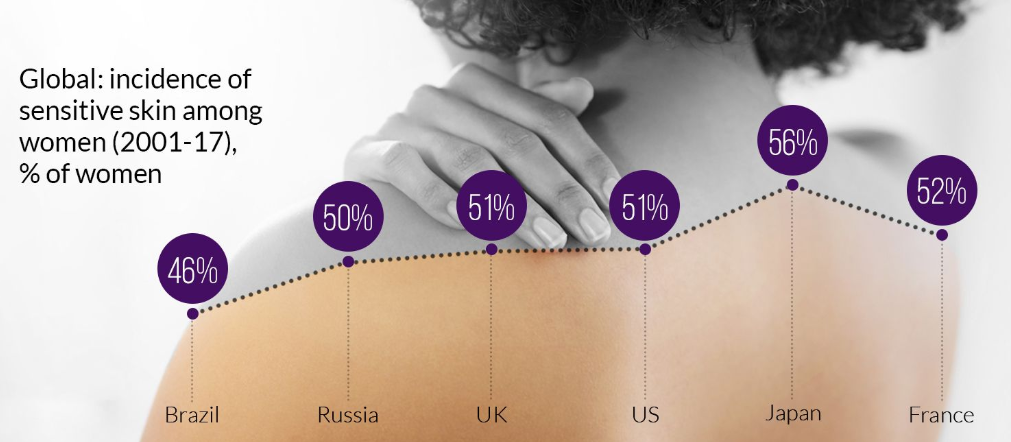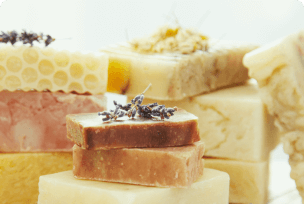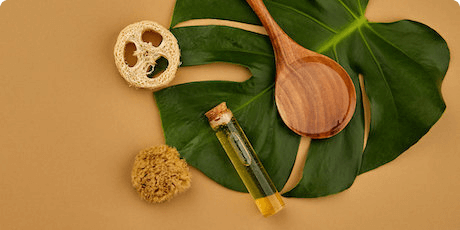
Sensitive skin issues can arise from a number of potential causes. Eczema and allergies is a key consideration; there could be hidden ‘nasties’ that could be present in products or ingredients that can lead to reactions. Globally eczema affects up to 3% of adults who suffer from chronic or relapsing itching and is a second skin condition after acne - with 20 % of babies and under 7-s affected, according to Mintel’s report.
Dry skin sufferers often prefer solutions with no irritating alcohols and fragrances. Skin conditions such as rosacea need very careful lifestyle management to avoid flare ups and can be triggered by a whole host of seemingly harmless products or ingredients, even everyday products such as coffee in some extreme cases. This, combined with cold and harsh weather conditions, can make life very difficult for sensitive skin sufferers, especially during the cold months and also increasing environmental pollution.
 Sensitive skin in women by country (Mintel)
Sensitive skin in women by country (Mintel)
Addressing sensitive skin concerns presents opportunities for brands
Sensitive skin product claims are among the fastest growing in Asia Pacific (APAC) countries, and can expand further given consumer interest and frustrations in this area. In China, sensitive skin is a facial skincare frustration for 31% of adults, while in Japan, sensitive skin affects almost half of all adults.
For brands that are looking to tap into the sensitive skin market segment, there is a great deal of scope for more product development and innovation as the consumer demand is there and new product development is limited. According to Mintel’s report, A year of innovation in soap, bath & shower 2020, just 13% of SBS launches in Europe in 2019 were suitable for sensitive skin, and less than 1% use probiotics.
Other opportunities in Europe exist for products addressing sensitive skin concerns in male grooming and increase interest in having tattoos, see our blog here for more information.
 Syndet bars for sensitive skin
Syndet bars for sensitive skin
For brands and manufacturers keen to get in on this market, there exists a perfect opportunity worldwide, but especially in the APAC region with 35% of buyers of soap, bath and shower products in China willing to pay more for products free from certain ingredients (eg soap, alcohol and ‘free from’ formulas), Mintel.
Syndet bases such as Syndopal are perfect for developing mild products suitable for sensitive skin and packaging-free product applications including solid shampoo bars and conditioners, beauty bars and solid facial cleansers. These also have the added advantage of zero packaging which boosts the appeal to increasingly eco-conscious consumers.
Syndopal for mild cleansing and sensitive skin
Fulfilling such sensitive skincare needs and meeting these requirements are features of syndet bar formulations, which are perfectly suited to addressing the growing demand for this niche market with mild product formulations and ph neutral features.
With its improved processability, pH 5.5-6.5 noodle base and ultra-mild characteristics, personal care brands and manufacturers can now look at capitalising on all growing markets in pharmaceutical and personal care. Syndopal opens up these sectors to manufacturers who would not have been able to manufacture syndet bars previously. With Syndopal it is easy to create new business opportunities and products, with less packaging and improve environmental credentials.
From a business and production perspective, Syndet bases, like Syndopal also offer personal care brands and manufacturers the added advantage of creating solid shampoo, body bars and beauty bars as it doesn’t require specialist equipment or added investment in production methods.
 Syndopal – Cleansing Facial Syndet Bar Formulation
Syndopal – Cleansing Facial Syndet Bar Formulation
For more Syndopal - syndet formulations download our brochure below.

























